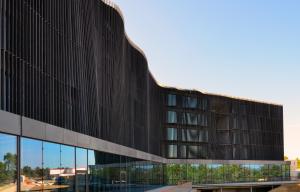An architect revisits his creation
19 Nov 2012
-
Robert Arnoux
Vertical slats running the full length of the facade create the "kinetic illusion" for the motorists travelling along the Vinon road.
An architect is like a surrogate mother, giving birth to a child who will be raised by someone else.
"There's a feeling of being dispossessed," said Laurent Bonhomme, as he walked the halls of the completed ITER Headquarters building last week.
Bonhomme, who is based in neighbouring Vinon-sur-Verdon, teamed with colleague Rudy Ricciotti from Marseille to design the office building that will progressively accommodate about half of the present ITER staff, housed in some 250 offices.
"Yes, he mused, it's a strange feeling. The baby you've carried for more than two years is not yours anymore. Now I need to ask permission to visit ..."
A veteran architect, Bonhomme is familiar with such "building blues"... it goes with the job. This time, however, the baby was special. "I've done several projects in the 50- to 80-office range but a 250-office building like the ITER Headquarters is quite exceptional in this region."
What was also special for Bonhomme was to work in partnership with Rudy Ricciotti, one of the most creative (and provocative) architects of his generation. "Ricciotti and I, we represent the two extremes of this profession. His approach is very radical; mine is more down-to-earth, in line with the four principal constraints of the building process—functions, regulations, budget and schedule."
Improbable as it was, the partnership was fruitful. Both men agreed on the essentials: using the shape of the building as a visual pedestal—"a horizontal monolith for the exuberant verticality of Tokamak Building" that will rise in the background.
"When you design a building," says Bonhomme, "you must take into consideration how it will be seen from different angles and directions. In the case of the ITER Headquarters it was rather simple: basically, you have two important views, the one from the road to the northwest and the one from the platform to the south."
As the view from the platform is a private one—only people working in the installation will be able to enjoy it—the architects opted for a rather rigorous, no-thrills facade. But on the contrary, Bonhomme considered that the 13,500 motorists travelling along the Vinon road every day should be treated to a more exciting visual experience—a "kinetic illusion" that is created by vertical slats running the full length of the facade.
While some of the building's dwellers consider that these vertical slats are a nuisance ("prison bars" is a term that has been heard here and there ...) Bonhomme explains that, as with a painting or a photograph, "a view needs to be framed," especially in an office setting where concentration is important.
Architects can be tyrants, but only up to a point. "A successful building project is one that achieves a balance between the functionalities that the architect has anticipated and those that the user will develop."
Take for instance the wooden window seats that run around the building's patios: the architects' idea was to "add a different material to an environment dominated by glass and concrete." They anticipated that people would enjoy sitting there for a chat or for a private phone call.
Well, they do. But users have developed another, unexpected functionality: some of the window seats seem to be a perfect spot for potted plants ...


